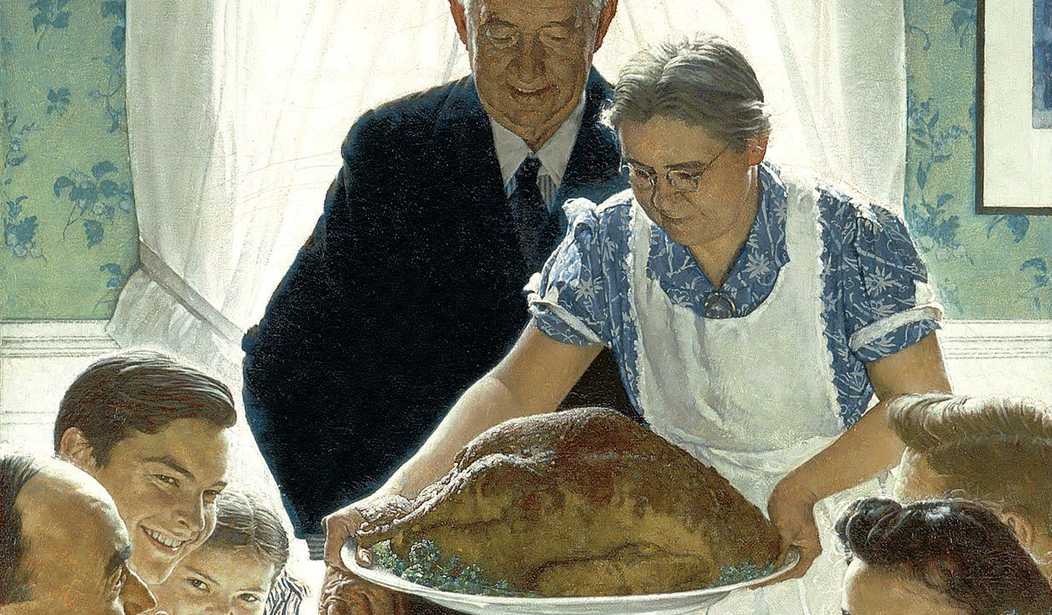“Thanksgiving has always been my idea of what a national public holiday should be," writes noted British columnist Peter Hitchens in Compact.
He contrasts the warmth and cheer of American Thanksgiving with "the wet black skies of Protestant Sundays" in England. He compares Thanksgiving to the soulless Revolution Day in the old Soviet Union with the endless parade of tanks, missiles, and pictures of Lenin.
"In an increasingly secular society, it is insistently religious," Hitchens writes of Thanksgiving. "If there is no God, to whom are they giving thanks?"
Good question. That's why Thanksgiving is a holiday that transcends the ordinary. Its traditions of food and family, ritual and rite are comforting in a very ordinary way.
It is sharpened by the approach of winter, the brisker air and briefer daylight making festive gatherings far more alluring. (One reason why I have always rejected the—often appealing—idea of going to live in the Southern Hemisphere is the horrible thought of a midsummer Christmas.) It is cleverly set on a Thursday, so creating a four-day weekend during which everyone can sleep or work off his excess. And beyond it lies Christmas, so that there is no bleak thought, as there can be on Dec. 26, that months of dreary winter lie ahead, with no light shining in the distance. Our own British bank holidays, as we oddly call them, are almost all on Mondays, a miserable day for a feast, a lifeless government-ordained day of rest fit for little except the nursing of hangovers. I generally go to work on these occasions, which is often more relaxing than hanging about at home waiting for them to end.
Peter. like his late brother Christopher, has a love affair with America for many of the same reasons. He sees the best of England and the best of the U.S. complementing one another. Both men saw America as a natural successor to England as the guardian of Western values.
Hitchens spent two separate Thanksgiving holidays in America.
Once, invited by friends up to Ithaca near New York’s lovely Finger Lakes, we drove long miles up from Washington through the hills of Pennsylvania on a dark, chilly day. It was a sort of American hajj, except that everyone was scattering in different directions for the same purpose, rather than heading for one place of pilgrimage. Countless others were on the move on similar missions. I think we saw license plates from more than 40 states. The next year, we held our own Thanksgiving meal (lighter on the uneatable pumpkin than tradition dictates) at our small house on a very friendly street in Bethesda, Md., and had the same encompassing feeling of being surrounded, for hundreds of miles in all directions, by others happily sharing one common experience.
Indeed, this religious American holiday is celebrated in a non-denominational way. We celebrate our "Americanness" more than anything. In that context, God is an important part of the celebration but how we worship and give thanks isn't as important as doing it together. That's why Jews, Muslims, Christians, Hindus, atheists, and every other religion share a Thanksgiving meal.
Since then, I have often thought that Britain, even now having much to be thankful for, might do well to copy America. Our major festivals have lost their savor as Christianity has faded from our lives. Why not an annual Thanksgiving on the Thursday nearest to Winston Churchill’s birthday (Nov. 30). It could be proclaimed annually from Windsor Castle by His Majesty the King, and the remaining Christians could use it as an occasion to recite the majestic General Thanksgiving: “We thine unworthy servants do give thee most humble and hearty thanks for all thy goodness and loving kindness to us and to all men…”
We can all say "Amen" to that.










